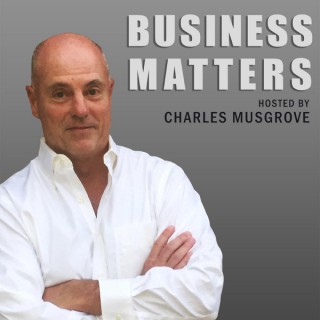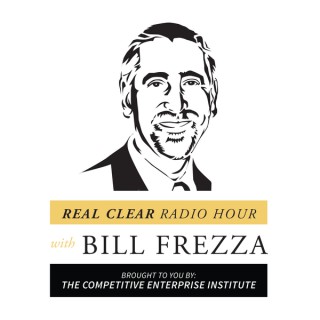Podcasts about common sense economics
- 10PODCASTS
- 14EPISODES
- 33mAVG DURATION
- 1MONTHLY NEW EPISODE
- Sep 26, 2025LATEST
POPULARITY
Latest podcast episodes about common sense economics
Empowering the Next Generation: Economics Olympiad & Common Sense Economics
Send us a textThis week, Juliette Sellgren sits down with Martina Bacik, the 21-year-old founder of the Economics Olympiad that has grown to 120,000 students in 35+ countries, and Tawni Hunt Ferrarini, coauthor of Common Sense Economics. Together they explore why teaching economics early matters, how competitions and books ignite curiosity, and what inspiring young people can teach us about building a hopeful, prosperous future.Support the showNever miss another AdamSmithWorks update.Follow us on Facebook, Twitter, and Instagram.
Let's talk about Trump's common sense economics and other countries cheating the US....
Let's talk about Trump's common sense economics and other countries cheating the US....
Send us a textHow do you teach about a man who does not fit neatly into a box? Hayek is one such man, and today, we tackle the difficult task of putting him in a box. We conclude that we cannot put someone like F. A. Hayek into boxes such as “economist” or “philosopher” or “political theorist”, because he did it all. How and when do you teach the ideas of a man who did it all? I'm excited to welcome Tawni Hunt Ferrarini to the podcast today to talk to us about teaching Hayek and his most important ideas. Ferrarini is a co-author of Common Sense Economics and an economic educator worldwide. We go through multiple ideas of in-class examples and places his thought could be applied in the context of modern education. Keep listening to hear me talk about how I, Pencil is scary. Want to explore more?Explore the Common Sense Economics website.Tawni Hunt Ferrarini, Real Life Economics: Rational or Complex, at EconTalk.Ryan Yonk on the China Dilemma, a Great Antidote podcast.Come explore Hayek with us in these two upcoming Online Programs led by Dr. Ferrarini:A Timeless [asynchronous] discussion, October 28-November 3 in the LF Portal.Dive Deep into Hayek's "Use of Knowledge in Society," a one session Virtual Reading Group, November 13th.Never miss another AdamSmithWorks update.Follow us on Facebook, Twitter, and Instagram.
How much will ignorance in economics cost you? As taxpayers and entrepreneurs, are you prioritizing your knowledge of the economy? In this episode, Howard Yaruss joins Tom Wheelwright in exploring how economics is the biggest impact on business, how financial common sense was lost, and how we can reclaim it to safeguard us from bad economic policies to ultimately create a better economy for everyone. Learn more about your ad choices. Visit megaphone.fm/adchoices
Discover how economics are understood as a series of tradeoffs. Our economic policies are too often convoluted with ingredients that stray from common sense. Matthew Hennessey joins Andy to discuss how you can cut through “magical thinking” and use economics to make better choices. SHOW NOTES: 5:28: Why Are So Many People Intimidated By Economics? 7:33: How Have Economics Become “Over-Credentialized?” 10:17: How Is MMT An Example Of Economic “Magical Thinking?” 14:54: How Are Economics A Series Of Choices? 30:42: What Can Steve Jobs Teach Us About Economics? 38:08: What's Wrong With The Fed Printing Money To Solve Problems?
#minimumwage, #amendment2, #florida https://answersthatcount.com The Florida voters passed Amendment 2 on November 3, 2020 paving the way for a mandated increase in the minimum wage starting in 2021 and increasing to $15/hour over the next 5 years. Florida is not the first to pass such a measure and likely will not be the last. There is even talk about a Federal mandate to increase the minimum wage like Florida. In this episode we talk with Professor of Economics at FSU, Joe Calhoun. From an economics perspective we talk about the effects of the change that the workforce in Florida will likely experience. This subject is also discussed in "Common Sense Economics, Third Edition" a book that Professor Joe is a co-author. To quote from the book, "the basic postulate of economics indicates that a higher minimum wage will reduce the employment of low-skill workers. ... the weight of the empirical evidence indicates that each 10 percent increase in the minimum wage will reduce employment by between 1 and 2 percent.Of course certain industries will be hit harder than others and there are many ripple effects of raising the minimum wage, like wage compression, increase in payroll related costs, like insurance, payroll taxes, etc.Check out this show for an informative discussion about the far reaching consequences of minimum wage legislation. Be sure to click the Subscribe Button and Hit the Notification Bell https://www.youtube.com/channel/UC5U0invXUtqoyrAnniwDjhQ/?sub_confirmation=1 Also, for more information, check us out at https://answersthatcount.com/ .We have articles of current, relevant information about business and economics.
The Cost of Government Meddling! Lockdown, Masks, Taxes, etc.
#government, #interventionBe sure to click the Subscribe Button and Hit the Notification Bell https://www.youtube.com/channel/UC5U0invXUtqoyrAnniwDjhQ/?sub_confirmation=1Also, for more information, check us out at https://answersthatcount.com/ . We have articles of current, relevant information about business and economics.For Apple Podcast, link here https://podcasts.apple.com/us/podcast/answers-that-count-hosted-by-charles-musgrove/id1479296350Link to and Like our Facebook page at https://www.facebook.com/answersthatcount.Please leave comments below, or send me requests or questions at cmusgrove@answersthatcount.comFSU Economics Professor Joe Calhoun joins us for another episode. We discuss the current economic events in the news for the week, including the unintended consequences of government intervention into regular trade between producers and consumers. Of course, the Government has the best of intentions when they enact legislation, but many times the cost of the unintended consequences outweigh the benefits.We have discussed the problems created by the cash for clunkers program in a recent podcast. We have discussed in several episodes the costs resulting from the COVID lockdown. And now, in the news this week we see where California Governor Newsome has enacted legislation banning the production of gas and diesel automobiles by 2035.In this episode, we also discuss another economic theory from the book Common Sense Economics. This discussion is about the theory 'Economic progress comes primarily through trade, investment, better way of doing things and sound economic institutions'. Check out this episode to see how we relate this theory to every day life. You will be sure to find nuggets of knowledge in this episode.
Economic Key Element #2 – There are No Free Lunches In our continuing series of interviews with Professor Joseph Calhoun, Economics Professor at Florida State University, we talk about another key element of the Twelve Key Elements of Economics from the Third Edition of “Common Sense Economics, What Everyone Should Know About Wealth and Prosperity.” As the co-author of this book, public speaker and professor at a major university, Professor Joe provides a great perspective of how basic economic theories apply to current economic conditions.In this interview we discuss key element #2, There is no such thing as a free lunch: Goods are scares and therefore we have to make choices. There are a couple of concepts we discuss in this episode that all relate to this key element, opportunity costs and prioritization of choices. Tune in and check out https://answersthatcount.com/ for articles and other episodes.
Incentives Matter & The Laffer Curve Explained by Professor Joe!
Economic Key Element #1 of 12 – Incentives Matter I recently interviewed Professor Joseph Calhoun, Economics Professor for Florida State University and co-author of the Third Edition of “Common Sense Economics, What Everyone Should Know About Wealth and Prosperity.” In this interview we talk about key element #1, Incentives Matter – Changes in benefits and costs will influence choices in a predictable manner.There are similarities between the Incentives Matter concept to the Laffer Curve, an economics theory developed by Arthur Laffer. The simple description of the Laffer Curve is that reducing tax rates will increase total tax revenue … meaning Americans will work and earn more if taxes are lower than they would at a higher tax rate.Here is a quote from Common Sense Economics, “Changes in incentives influence everyone’s choices, regardless of the mix of greedy, materialistic goals on the one hand and compassionate, altruistic goals on the other, that drive a specific decision.”
Welcome to the very first episode of The Nepali Economist. In this episode, we'll discuss one of the most important principles of economics. A principle that is usually considered the backbone of economic thinking: Incentives matter. Enjoy! Reference materials used for this episode: 1. Incentives Matter by Russell Roberts 2. Asal Arthshastra by Surath Giri (Nepali Translation of Common Sense Economics) 3. Freakonomics by Steven D. Levitt & Stephen J. Dubner
Show 11 - Segment 2 Tawni Ferrarini Common Sense Economics
"Economics" doesn't have to be a scary word for kids (or us adults). Dr. Tawni Ferrarini from the Hammond Institute for Free Enterprise discusses their "Common Sense Economics" material they offer schools. Dr. Ferrarini is one of the coauthors of _Common Sense Economics_. It makes financial and economic literacy possible for young children so they can build their own stable financial future and avoid some of the mistakes others make just because we don't know the basics of handling and saving money.
Russ and Levi interview Dr. Jim Gwartney, our institute's namesake. This is a wide-ranging discussion on Jim's life, experience at Ottawa University, and his opinions on the state of the world economy. Common Sense Economics book
Common Sense Economics with Bruce Yandle, Ryan Young, & Steve Forbes
The post Common Sense Economics with Bruce Yandle, Ryan Young, & Steve Forbes appeared first on RealClear Radio Hour.
Отсебятина Информбюро: — Безумный октябрь. — Подфейдинговый штопор. — Встреча с Максом. — Пожертвования слушателей. — Посылка от слушателя Игоря. Инфоповод: поездка в Португалию — Сопровождение инвалида. — Гостиница как бы пять как бы звёзд. — Мистические казусы (паранойя и дежавю). — Встреча с Лиссабоном (фотоальбом). — Памятники. — Бомжи. — Еда. — Вино. Nota Bene: — Сериал "Parenthood". — Книга "Common Sense Economics". I Speak Greenglish: — Вad blood. Партнер программы — КомпасГид: образование за рубежом, зарубежные культурные центры, гранты, стипендии, стажировки за рубежом, афиша.













